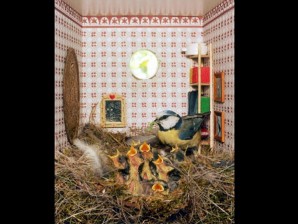Male bird loses interest in fading females, study finds
PARIS – Not unlike some among their human counterparts, male blue tits lose interest when their mates’ beauty starts fading, staying out longer and neglecting their offspring, a report said Monday.
Scientists, who dulled the bright blue head tinge that crowns the female of the species, subsequently noticed the males skulking off for more alone time and making fewer trips to feed their chicks.
“It seems that they stay around, but not in the nest,” study co-author Matteo Griggio told AFP.
“Probably they take a rest…. It is not a joke, probably they keep some energy, maybe for the next breeding season?”
Both male and female blue tits, which usually have several mating partners in a lifetime, have feathers on the tops of their heads that reflect UV light.
For the purposes of the experiment, the team from the Konrad Lorenz Institute of Ethology in Vienna waited for chicks to hatch before smearing an oil containing UV-blocking chemicals on the crowns of the females.
Article continues after this advertisementTo confirm that it would not be the smell that put off the males, they applied the same oil, without UV-blockers, to a separate test group of females.
Article continues after this advertisementThe scientists said they took care not to render the partners unrecognisable to each other.
“The UV reflectance of the crown plumage of female blue tits significantly affected male investment in feeding nestlings,” the team wrote in a study published in the BioMed Central journal Frontiers in Zoology.
“Males made less frequent feeding trips when paired with UV-reduced females.”
While much has been written about male posturing and strutting to compete for female attention, this was a rare study to measure male response to female attractiveness in the animal kingdom.
The results showed that female blue tits must invest a lot of time in preening to remain attractive as sexual partners.
In nature, those birds with poorer personal hygiene risk losing their blue lustre under a coating of dust, pollution or parasites.
